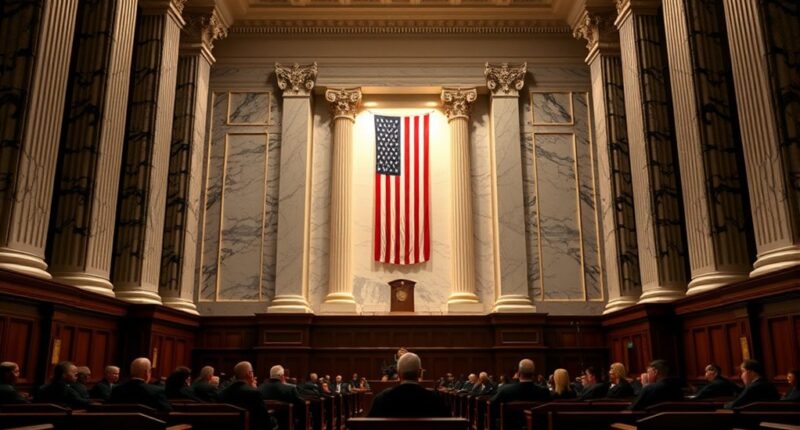The Supreme Court is reexamining the nondelegation doctrine, which limits Congress from giving too much lawmaking power to agencies. Courts have recently become more deferential, allowing agencies broad discretion and interpreting statutes flexibly. This trend risks weakening the separation of powers, giving agencies more authority than intended. As the Court’s approach shifts, understanding whether this doctrine can still restrain agency overreach becomes vital—keep exploring how these changes might shape future governance.
Key Takeaways
- The Supreme Court is reexamining the limits of Congress’s authority to delegate lawmaking power to agencies.
- Recent decisions show increased judicial deference, weakening the traditional nondelegation doctrine.
- Courts are hesitant to strike down agency actions, favoring flexibility and expertise in regulation.
- There is ongoing debate about establishing clearer standards to define permissible delegation boundaries.
- The evolving judicial approach risks expanding agency power and blurring separation of powers.

Has the nondelegation doctrine lost its grip on modern administrative law? It’s a question that weighs heavily as courts and legal scholars examine the scope of executive authority and legislative boundaries. Traditionally, this doctrine served as a safeguard, ensuring that Congress didn’t hand over its lawmaking power to administrative agencies. The idea was straightforward: Congress writes the laws, and agencies implement them within clear limits. But in recent years, the line has blurred, and courts have shown increasing deference to agencies’ ability to interpret and fill in legislative gaps. This shift prompts you to ask whether the nondelegation doctrine still functions as an effective check or if it’s becoming a relic.
At its core, the nondelegation doctrine aims to prevent Congress from ceding too much of its lawmaking authority to executive agencies. However, courts are now more inclined to interpret statutes broadly, allowing agencies significant discretion to regulate complex issues. This approach reflects a recognition that modern governance often requires expertise and flexibility — qualities agencies are better positioned to provide than Congress itself. Yet, this expansion raises concerns about encroaching on legislative boundaries, potentially undermining the separation of powers. If agencies can craft policies with minimal legislative oversight, you might worry that executive authority is growing unchecked, eroding the foundational principle that only Congress should set broad policy directions.
In recent Supreme Court decisions, you notice a trend where the judiciary is cautious about intervening in agency rulemaking. Instead of striking down vague or overly broad delegations, courts often uphold agency actions, emphasizing the importance of practical governance. This deference suggests that the nondelegation doctrine is losing some of its teeth, possibly because the Court recognizes that strict adherence might hinder effective administration. Nevertheless, the doctrine isn’t entirely discarded; instead, it’s being reinterpreted. You see some justices advocating for a clearer standard to determine when delegation crosses the line, highlighting ongoing debates about balancing executive authority against legislative boundaries.
This evolving landscape means that, as a citizen or legal observer, you need to understand how the courts are reshaping the limits of administrative power. The nondelegation doctrine may no longer serve as an absolute barrier, but it still influences how agencies operate within the bounds of law. The challenge lies in ensuring that agencies don’t overstep, respecting the constitutional separation of powers while allowing enough flexibility to address modern complexities. The future of the doctrine hinges on whether courts will tighten restrictions again or continue to endorse broader agency discretion, shaping the balance of power in administrative law for years to come.
Frequently Asked Questions
How Does the Nondelegation Doctrine Impact Everyday Government Functions?
The nondelegation doctrine limits how much authority agencies have, impacting everyday government functions like regulatory oversight. It guarantees agencies don’t overreach their power, maintaining a balance that encourages citizen participation. When agencies act within their delegated powers, you benefit from fair regulations and transparency. If courts enforce this doctrine more strictly, it could slow decision-making, but also protect your rights by preventing unchecked agency authority.
What Historical Cases Shaped the Nondelegation Doctrine’s Development?
You should know that delegation history and landmark rulings considerably shaped the nondelegation doctrine. Key cases like *J.W. Hampton, Jr. & Co. v. United States* established that Congress can delegate authority if it provides an intelligible principle. Later, *Whitman v. American Trucking Associations* reaffirmed this, emphasizing that delegation must follow clear guidelines. These rulings set the foundation for how agencies exercise delegated powers today.
Are There Specific Industries More Affected by Agency Power Limits?
Think of agency power limits like a filter on a coffee machine—some industries face tighter restrictions, affecting how they operate. Financial and environmental sectors are most impacted by industry-specific regulations, as agencies shape rules that directly influence their practices. These sectoral impacts can slow innovation or increase compliance costs, making it essential for you to stay informed about regulatory shifts that could reshape your industry’s landscape and compliance strategies.
How Might Future Supreme Court Decisions Alter Administrative Agency Authority?
Future Supreme Court decisions could tighten judicial oversight over agencies, limiting their authority, especially if they find legislative discretion too broad. You might see courts scrutinize agency actions more closely, requiring clearer boundaries for delegation of powers. This could lead to significant changes in how agencies operate, forcing them to justify decisions more thoroughly and potentially reducing their influence across various sectors, especially those with complex or ambiguous legislative mandates.
What Are the Potential Consequences of Relaxing or Tightening Nondelegation Rules?
Relaxing nondelegation rules could unleash chaos, threatening the separation of powers by giving agencies too much unchecked authority. This might boost regulatory flexibility, allowing agencies to adapt swiftly, but risks overreach. Tightening rules, on the other hand, preserves clear boundaries, ensuring agencies stay within their limits. You’d see a more balanced system, but possibly less agility in responding to complex issues, making governance feel slow and rigid.
Conclusion
As you follow the Supreme Court’s reconsideration of the nondelegation doctrine, remember it’s a tightrope walk between government authority and individual rights. This debate isn’t just about legal technicalities; it’s about ensuring power doesn’t run amok. Keep your eyes open, because the stakes are high, and the balance of power could shift with a single ruling. Ultimately, it’s a reminder that sometimes, you have to read between the lines to see what’s truly at stake.










